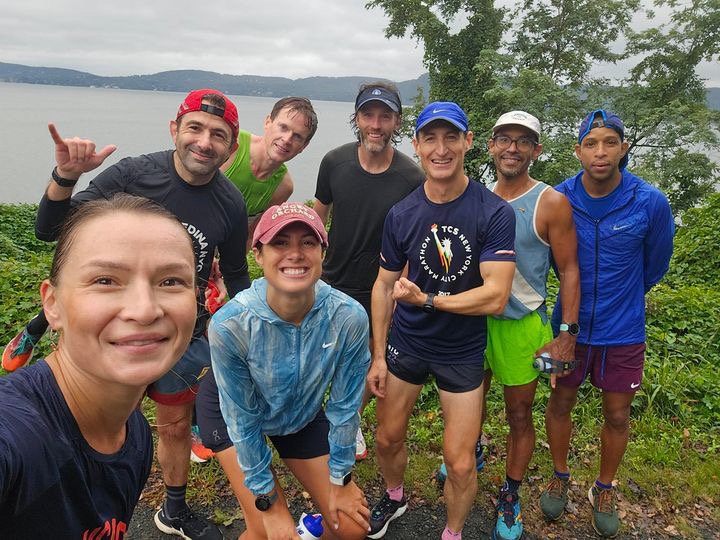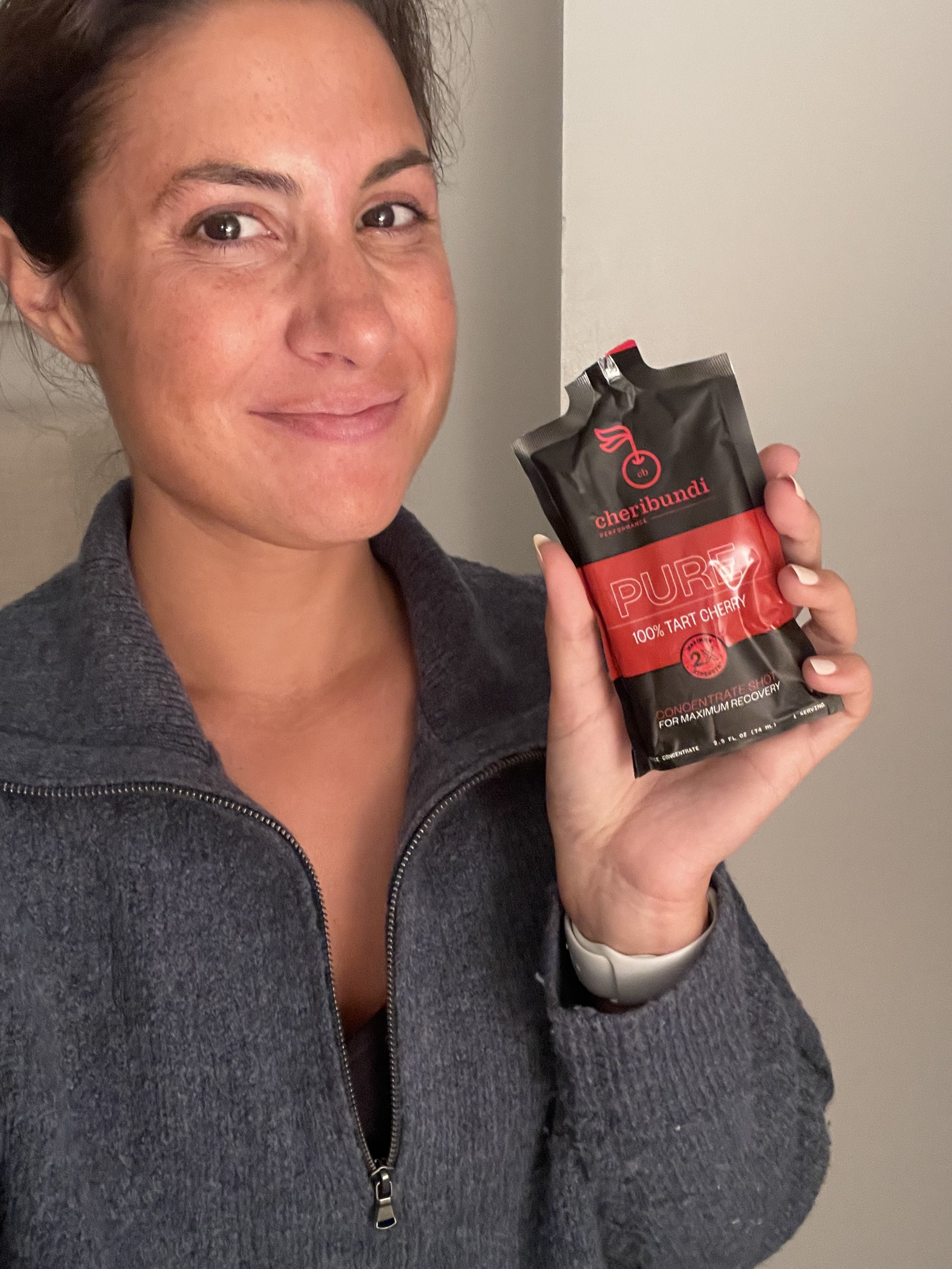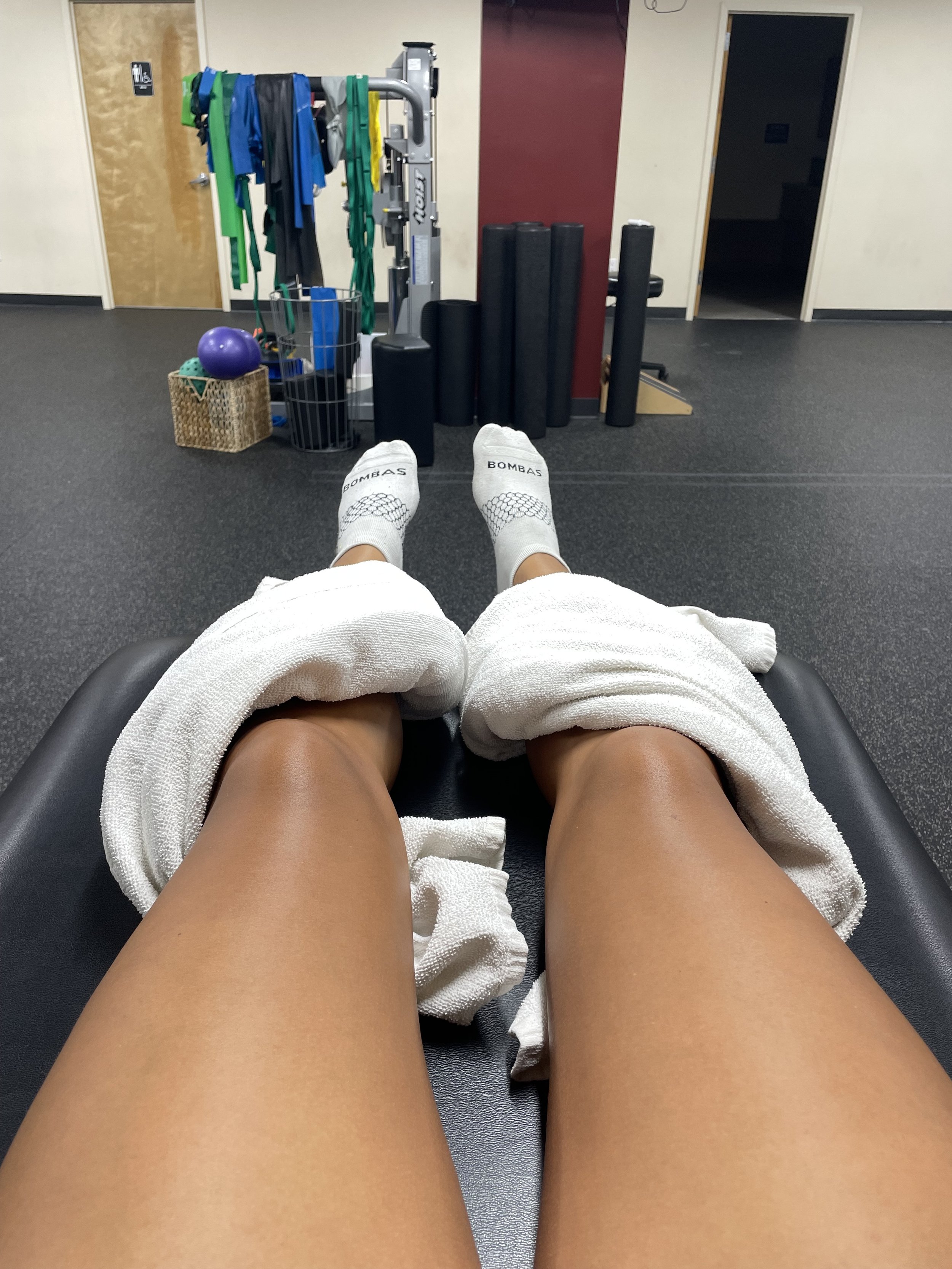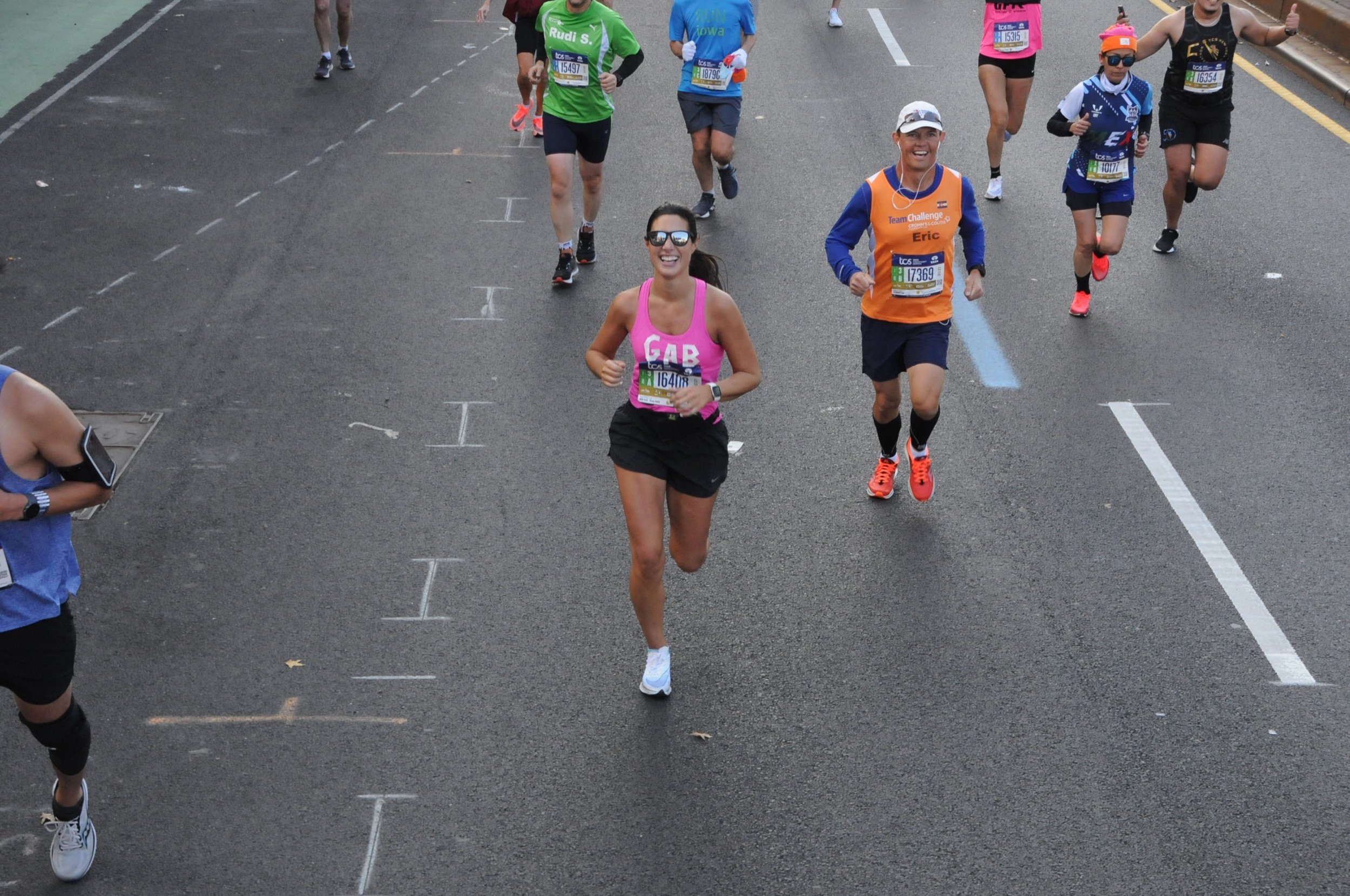Stress Fracture Diagnosis Right Before A Marathon
Uh-Oh
I was two weeks away from running the Chicago Marathon, and on my last long run of the season, when I got injured. I couldn’t make sense of the pain, but it was severe. I thought it was a muscle tear, and I feared it may be bad enough to impact my speed during the race that I had been carefully building up to. But I did all that I could think of… I stopped running. I went home to rest and waited for it to feel better.
As the days went on and the race got closer, I showed little sign of improvement. I was limping around, struggling to do simple tasks let alone get back out and follow my training plan for the taper. What was going on?
I went to an orthopedic immediately, but after an X Ray I was told to come back in a few weeks if the pain does not subside. So there I was, the week of my race, in a position I had never been before. Rather than the usual jitters leading up to the big event, I was working through aggressive recovery, holding out hope I would miraculously heal. It didn’t go that way.
I had never had to make such a difficult decision, with so many factors, based on such little information. Do I try to run it anyway? Or do I forfeit my entry to the Chicago Marathon?
So when packing my bags for Chicago, I processed the reality of my situation. As much I wanted to run my race, I ultimately realized I couldn’t. I sat on my bed and cried. No one could have told me what to do, I had to come to make that choice on my own. But it was incredibly challenging to give up what was months of training and sacrifices and hard work, and take myself out of the race before it even started. I didn’t even pack a pair of running shoes.
And it’s good I didn’t, because it turns out that I had a stress fracture in my hip in two places. I was never going to be able to run that race. And if I did, I would have risked breaking my pelvis. Not to be dramatic, but.. OUCH.
I decided to write this post because I know there are people out there right now, just like me, who were injured in the past few days - and who have been training to run the New York Marathon on November 5th. You may feel pretty unlucky right now, and you may be questioning why this happened to you. I know I did! Like me, you could be over analyzing everything that happened, trying to figure out what your injury really is, and if it’s something you can overcome and run through or if it’s the end of the road. You’re not alone. I wish I found more non-medical runners perspectives when I was first looking into this. So If you want my advice, these are the most valuable lessons I learned from this whole experience.:
Don’t hesitate in finding out exactly what the problem is
Seek out an Orthopedic who specializes in running
Your body is telling you to rest, listen
It’s ok to be frustrated and disappointed
If you can’t do the race, you didn’t go all the way for nothing
If I could help even just one other person from going through what I did, I know that’s something valuable to come out of all this.
The Training
I have ran 2 marathons so far, on a quest to run all the World Major Marathons. I feel proud to have run the distance sub 4:00 hours, completing it faster than the average female. But after running the Tokyo Marathon earlier this year 40 seconds shy of my first effort at the NYC Marathon, I was shooting for a big PR. I was hungry to do better. I shaved almost 20 minutes off my half marathon time in the Spring, and I planned on doing the same in the Chicago Marathon in the fall.
In addition to a few casual running clubs I do, I signed up for a Coach and followed an intensive training program. I had increased my mileage slowly and strategically, but I had remained in shape all year. I never gave myself a chance to lose fitness, but I also never gave myself a chance to rest.
By the end of the summer I was logging 50 - 60 miles a week. I was always doing a warm up and cool down as suggested. Beyond the runs, I did strength training at the gym. I stood at my desk. I did physical therapy twice a week and was successfully healing from shin splints. I was walking to and from work, to and from runs, and I averaged about 20,000 steps a day. It wasn’t unusual for me to get up to 40k or more. And I didn’t see this as a concern.
I never worried about a stress fracture before because I have a healthy BMI, and eat very well. I even take magnesium and vitamins to support my bone and muscle health.
I felt so strong, and I was getting faster. It was all working, until it wasn’t.
The Injury
I was running with my team on a trail run, north of NYC. I had never done a trail before, I felt wildly unprepared in my Zoom X’s. The rain was coming down, and my footing felt unstable on the loose gravel and leaves. I felt strong until we hit the hills and I started falling behind.
I was feeling a sense of pressure in my groin and I was pushing so hard. All of a sudden while charging up hill about 10 miles in, I felt a rush of pain on my left groin. I reached the top, kept going, and it subsided slightly so I tried to force through it and catch up with the group. It went on this way for a few miles until I stopped for a second, and at just under 14 miles I could not get my legs to move again back into a stride. It was the first time I ever didn’t finish a run.
I walked back to the cars and went to brunch like it was just a muscle cramp. I convinced myself that’s all it was that day just so I could keep myself from losing it.
The Diagnosis
In the first few days my primary symptoms were a mix of the following:
Tough to pull on pants or socks when balancing on my left leg and lifting my right foot
Swelling and pain in my pelvic area that hurt to the touch
Uncomfortable while sleeping, and glute pain while adjusting positions
Sense of pulling while walking
Soreness while standing for a while
Stiffness in my hip
I shared all the details with my specialists, and received a lot of feedback and suggestions, but no one had given me reason to think this was anything more than a hamstring sprain. I did a ton of reading about the type of muscle pain it could be, and the grade or severity of a potential muscle tear, but it only made me more confused.
I have a stress fracture in my hip in two places. The first is the inferior pubic ramus (the bottom bones we sit on) and the anterioinferior/medial acetabulum (the hip socket). I have a full tear in my hip labrum and some partial tears in the glute and groin. I’m all sorts of messed up!
The Reason
A stress fracture in your pelvis is apparently common for long distance runners. But I was shocked I had received this diagnosis. I never felt pain before in this area. The symptoms made perfect sense, but how did my bone get here? I thought I ran smart. I followed the plan. Where did I go wrong?
I will probably never know fully why. But a stress fracture is caused by repeat stress of the bone over a prolonged period of time, meaning it actually didn’t come out of nowhere! I may not have felt it, but it was brewing. My gut tells me it’s biomechanics.
Without a Diagnosis
Things started off pretty bad. The first few days hurt at rest, and especially when moving or walking. At day 7 I felt like I was making progress and was encouraged to try my first run. My Coach said to try just 30 minutes and see how I felt, and since I was 1 week away from the marathon, being able to do that felt critical. But the experience was unbearable. In my first few steps, I felt like I was not in my own body anymore. I made it 2/3 of a mile before I walked home and burst into tears.
Looking back on the last month, I wish I had my diagnosis earlier. It would have saved weeks of stress, and probably further injury. I knew my orthopedic needed to request the MRI for me, and that it would take time to get on a schedule at a radiologist. But I should have demanded it with the race so soon.
My first mistake was not going to a sports medicine doctor. I wish I saw an orthopedic who specializes in running and was more empathetic to my situation. My doctor spent all of 1 minute with me, doing a slight test of my leg mobility. I was told:
The average American body isn’t built to keep running many marathons.
When I asked should I not be running, he said you have to walk before you run.
I know it’s a fact, but it stung. It felt like he said “you had this coming.”
Alternatively the woman who called me with my results had a different approach, and told me delicately that she was so sorry to share the news and hoped I wouldn’t be planning to run the New York City Marathon. It was empathetic. She said she was a runner too.
I should have advocated for myself more when I first re-visited my orthopedic. If you feel as if you were not taken seriously, be direct, and ask for a diagnosis. Get a second opinion if needed. Regardless if you had an Xray done, still get the MRI, as a lot does not show up on an Xray. Express your concern honestly, and that you need an MRI stat and don’t take no for an answer.
If a doctor told me I had a stress fracture before the Chicago Marathon, they would have immediately advised me not to run. I probably would have approached my recovery differently. I would have tried to rest as much as possible but instead, without guidance, I tried to rehab.
Recovery
In the past 4 weeks I’ve spent many hours and hundreds of dollars on physical therapy and acupuncture for what I thought was a muscle sprain or tear. I got a massage. I ordered boxes of tart cherry juice to boost recovery. I iced and applied heat regularly, I stretched. I did aqua aerobics. I walked and jumped around Chicago wishing my leg would just “keep up with me.” I took NSAID’s for anti inflammation which may reduce the ability for bone to heal. And I rode a damn horse!! While I listened to my body, I thought the pain I was feeling was normal. Now, I know how important it is to to prioritize rest.
After working so hard for months I didn’t want to lose the muscle I built, and the strength I achieved in my arms, core and quads while running or my glutes, ankles and calves I developed through PT. I also didn’t want to drop my vO2 max I had increased during training. How long can you go without running before you lose your fitness? I thought that maybe there was a chance I could still utilize my training and run a race this Fall, like the Philadelphia marathon. So recovering quickly and maintaining activity was the goal.
But I can’t stress this enough. Making a full recovery is more important than staying in shape. It is not worth risking longevity in this sport, and more so your health, for a medal or a star.
Don’t worry about what you might be losing and focus on just getting healthy. I’ve always said this, but now speaking from experience, getting to the starting line is an accomplishment in itself. A friend told me that you have to respect the distance. And I do believe that running 26.2 miles is a distance that demands a lot from you too. I could have never ran that race, and I would have risked breaking my pelvis if I did. I know I made the right decision not to race, 1000%.
Since I received the diagnosis this week, I have started coming to terms with what will be a long recovery ahead of me, 8 - 12 weeks. While I have an appointment in a few days to get more look at the images and discuss treatment, I’ve already been given a lot of advice and information to work with.
While I’m not a doctor, and everyone’s plan should be personalized to their unique injury, here is what I was told I should know about mine, and how to expedite the process for my injury to heal:
The injury will heal in time, but returning too soon can delay or prevent healing
REST REST REST (limit walking, exercising, PT, and standing around)
Non-weight bearing recommended (use crutches if possible)
Don’t get an MRI again too soon, wait until 3-4 months to confirm it healed permanently
Even with a treatment plan, I can’t stop thinking back to what happened and what I could have done differently. I want to understand more about the root cause. I plan on working with my physical therapist once I can get back to running to see if this was brought on by my running form or even an imbalance in the lengths of my legs. I’m bow legged and have had a history of injury on the inner left leg. I’ve also been told I adduct while I run, and bring the left hip inward to stay erect.
Either way, if I want to get back to doing what I love without this happening again, it’s worth exploring.
The Fall Out
I think there’s an unfortunate stigma with stress fractures. People are quick to assume that the athlete brought the stress fracture on themself, and I think that’s really harsh, and unfair.
If you’re reading this and currently in fear you have a stress fracture, I want to reassure you, you did not deserve this. And you should not beat yourself up about it. Regardless of how it happened or why, you’re injured and that’s sucky. On top of that, if you were training for a race you’re now dealing with the depression that goes with dropping out after you were fully committed.
At the very least, getting injured two weeks before a race is bad timing. I had fundraised $2,000 for a charity in order to gain entry to the race, which was non-transferrable to next year. I also paid around $200 in race fees, on top of a pricey photo package. I had travel plans to go to Chicago for the race, not only for myself, but also my family who were going to cheer me on. We had already pre-paid flights and hotels. But at the end of the day, none of that is the end of the world.
I’m really glad we still went to Chicago as a family. We enjoyed the weekend together and I got to cheer on so many of my friends who I trained with and performed so well! They said seeing me gave them a good boost of energy, and I’m glad I could serve some kind of purpose that day. So if you’re debating attending the race as a fan instead of a runner, I would say it’s worth it to experience the day in some way. It was really really fun.
Buy it’s totally normal to be emotional about this diagnosis and injury. To be disappointed and frustrated. I was so close to that race…. I completed the training, and all the hard work was behind me. I looked forward to the two weeks of taper to reduce my mileage, I earned it.
It ended up being a really physically and mentally challenging time for me instead. But like I said earlier, I learned a lot through this experience. I thought I was a pretty tough girl before, but now I know I can handle a lot more than I thought I did.
What’s Next
Of course I wish I could shut my eyes and this injury would have never happened. I wish this was a post on my amazing marathon in Chicago instead. But it was not meant to be. It took me a few weeks, but I’m really trying to forgive myself for the mistakes I may have made in training.
I miss the routine runs with my friends, the motivation we gave each other, and the community I felt the past few months. If anything, that is something I’m really grateful to come out of this training season. All the support! I never felt alone in this.
If I didn’t show my body enough respect then, I certainly do now. The human body is capable of so much, but we only get one, and I need to take care of myself. I’m proud of myself for exercising good judgement when it mattered most, and deciding to forfeit my entry to the race.
I’ll never know what I would have accomplished that day. I was on track for a really good run I think! Now unfortunately I’ll be retiring this season with a lot of untapped potential. I vaguely remember a version of me at the end of September who truly felt invincible, hungry to chase a BQ, and deeply passionate about running.
4 weeks after my injury… I forget where my Garmin watch is. I stopped checking Strava or throwing out kudos. I haven’t had one activity in Training Peaks.
The moment of the race passed, life has resumed, and everyone has moved on so I have to too. Even though I’ve been feeling consumed by this injury the last few weeks, I now feel at peace with the clarity I have with my diagnosis. Not knowing was half the battle, but now it’s clear that my season is done, and all I should do now is rest. This has always been hard for me. But I plan on TRULY RESTING my body and just working on my mind. I’m looking forward to picking up a book again for the first time in months with my new found time.
There will be a day I come back from this, hopefully stronger and wiser than before. This is just a set back, it’s a part of life. It’s made me ready to move into the next chapter.
In a way, I wondered if I ever would’ve slowed down enough to take this break.
It’s the first time I’ve ever gone this long without running in my entire adult life. Because I love to run, I miss it. When I feel down about that, I remind myself that resting right now will come to benefit the future me, who gets back out there one day and finishes all the World Major Marathons.
I don’t know exactly when I’ll be back, but I can’t wait for the feeling of that first run.
Xx Gab










How I navigated a stress fracture diagnosis training for, and right before, a marathon.